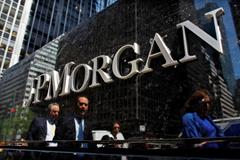JP Morgan on Friday said it had placed Nigeria on a negative index watch on its Government Bond Index (GBI-EM).
The bank, which runs the most commonly used emerging debt indexes, said it had placed Nigeria on a negative index watch and would assess its place on theGovernment Bond Index (GBI-EM) over the next three to five months.
Removal from the index would force funds tracking it to sell Nigerian bonds from their portfolios, potentially resulting in significant capital outflows. This in turn would raise borrowing costs for Africa’s largest economy, although analysts said they did not expect JP Morgan to take such a step.
The bank added Nigeria to the widely followed index in 2012, when liquidity was improving, making it only the second African country after South Africa to be included. It added Nigeria’s 2014, 2019, 2022 and 2024 bonds, which make up 1.8 percent of the GBI-EM Global Diversified index.
Investors have $216 billion benchmarked to the GBI-EM, the most popular emerging local debt index. But the bank said the current liquidity issues made it hard for foreign investors to replicate it.
“If we are unable to verify sufficient liquidity in Nigeria’s spot FX and local treasury bond market … it will trigger a review … for removal,” JP Morgan said.
“Conversely, if liquidity improves and investors are able to transact with minimal hurdles, Nigeria will be removed from index watch negative.”
The forex and bond markets have come under pressure after the price of oil, Nigeria’s main export, plunged. In response, the central bank devalued the naira by 8 percent last year and tightened trading rules to curb speculation.
David Spegel, head of emerging debt at BNP Paribas, said: “I would be very surprised if Nigeria was ejected from the index entirely given the size of the economy and potential for future capital raising in the debt and equity markets there.
“Eventually the whole oil risk issue will be priced into the market and flows of capital and investment will return to Nigeria,” Spegel said.
FRENCH VERSION
JP Morgan vendredi dit qu’il avait placé le Nigeria sur une montred’indice négatif sur sa Government Bond Index (GBI-EM).
Supprimé de l’index forcerait les fonds pour vendre desobligations nigérianes de leurs portefeuilles, entraînantpotentiellement importantes sorties de capitaux de suivi. Cela àson tour soulèverait des coûts d’emprunt pour la plus grandeéconomie de l’Afrique, même si les analystes ont dit qu’ilsn’attendaient pas de JP Morgan à prendre une telle mesure.
La Banque a ajouté Nigéria à l’indice largement suivie en 2012,lorsque la liquidité s’améliore, ce qui en fait seulement le deuxièmepays africain après l’Afrique du Sud à être inclus. Elle a ajoutéobligations de 2014, 2019, 2022 et 2024 du Nigéria, quireprésentent 1,8 % de l’indice Global Diversified de GBI-EM.
Les investisseurs ont $ 216 milliards comparé à la GBI-EM, l’indicede la dette locale émergents les plus populaire. Mais la Banque dit que les problèmes de liquidité actuelle rendus difficile pour lesinvestisseurs étrangers pour le répliquer.
« À l’inverse, si la liquidité s’améliore et les investisseurs sont en mesure d’effectuer des transactions avec des haies minimes,Nigeria est retiré montre indice négatif. »
Le forex et les marchés obligataires sont venus sous pressionaprès que le prix du pétrole, principal produit d’exportation du Nigeria, plongé. En réponse, la Banque centrale a dévalué le nairade 8 pour cent l’an dernier et resserré les règles visant à lutter contre la spéculation des transactions.
David Spegel, chef de la dette émergente chez BNP Paribas, a déclaré: “je serais très surpris si le Nigeria a été éjecté de l’indexentièrement étant donné la taille de l’économie et les possibilitéspour les futurs raising capital sur les marchés actions etobligations, il.
« Finalement la question du risque huile entière sera vendue sur lemarché et les flux de capitaux et d’investissements reviendra auNigeria », a déclaré Spegel.



